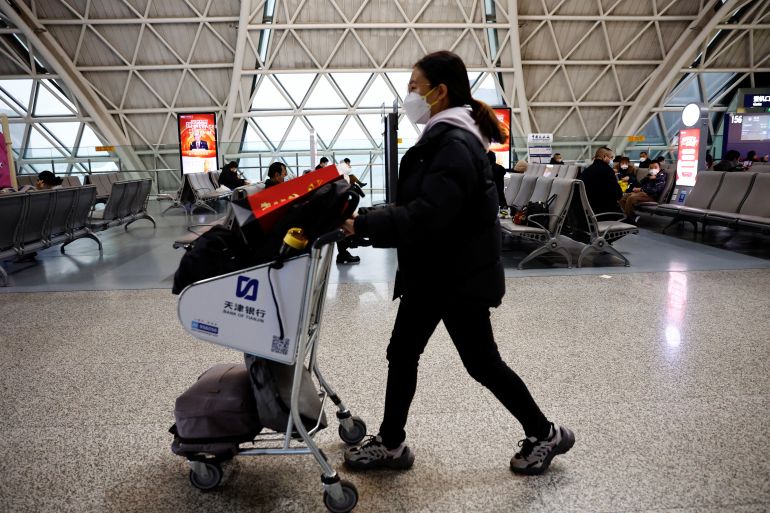France, UK join growing list of countries in imposing COVID curbs
Visitors from China will be required to test negative for COVID-19 before boarding flights.

France and the United Kingdom have joined Spain and Italy in requiring travellers arriving from China to provide a negative COVID-19 test result before boarding flights.
France said on Friday the tests will have to be done less than 48 hours old before departure and will be required on direct flights from China and flights with stopovers, with random tests carried out on passengers on arrival.
Keep reading
list of 4 itemsSouth Korea to test travellers from China amid COVID surge
Italy orders COVID tests for China arrivals, EU seeks common rule
Growing list of countries imposing COVID rules on China arrivals
Positive tests will be sequenced to check for new variants, the government said.
Meanwhile, UK media reported the country will require travellers leaving China for Britain to also provide proof of a negative COVID-19 test before boarding.
London and Paris became the latest governments to impose restrictions on arrivals from China, where coronavirus cases have surged. Earlier on Friday, Spain’s government announced new COVID-19 regulations for passengers arriving at the country’s airports from the Asian country.
Travellers from China will be required to test negative for COVID-19 or prove they have been fully vaccinated against the disease, Spanish health minister Carolina Darias told a news conference.
She added that Spain would coordinate at a high level with other EU member states to adopt a common policy while pushing for a revision of the current conditions that need to be met by travellers seeking to obtain the EU’s so-called Digital COVID Certificate.
The new measure comes after the European Union’s Health Security Committee met on Thursday to discuss the bloc’s strategy for mitigating the spread of the virus amid an influx of visitors from China after Beijing lifted most of its travel restrictions.
Italy, which had already mandated tests on arrival for all travellers by air from China, called for such measures to be extended across the EU, warning they risked being ineffective if applied in a piecemeal fashion by only some countries within the bloc.
But the committee, which is composed of officials from health ministries across the bloc and chaired by the European Commission, said it believed an EU-wide introduction of mandatory COVID-19 screenings for travellers from China was currently “unjustified”.
Meanwhile, Germany said it was seeking a coordinated system to monitor variants across European airports, health minister Karl Lauterbach said on Friday.
With such a system, new variants of the coronavirus can be detected and appropriate measures taken quickly, the minister said, adding that it was “not yet necessary” for routine tests on passengers from China as all variants currently seen are already known.
The European Centre for Disease Prevention and Control (ECDC) said “higher population immunity” in the EU and the “prior emergence and subsequent replacement of variants currently circulating in China” meant the surge in infections there was not anticipated to affect the bloc.
“We remain vigilant and will be ready to use the emergency brake if necessary,” the ECDC added.
Any decision taken by the committee, which met frequently at the height of the COVID-19 pandemic in Europe to coordinate policies, would only be advisory.
Each EU member state is free to make its own policies, but the body’s aim is to agree to a common line and apply it across the bloc.
Portugal has said it sees no need for new restrictions, while Austria has stressed the economic benefits of Chinese tourists’ return to Europe.
‘Discriminatory’ restrictions condemned
Outside of the EU, the scale of the outbreak in China and doubts over official data have prompted countries including the United States, India, Taiwan, South Korea and Japan to impose their own new travel rules on Chinese visitors.
Other countries that have joined in imposing such restrictions include Malaysia, Australia, and the Philippines.
Signalling Beijing’s discontent with the measures, Chinese state media said on Thursday that the COVID-19 testing requirements imposed in response to a surging wave of infections within the country were “discriminatory”.
“The real intention is to sabotage China’s three years of COVID-19 control efforts and attack the country’s system,” the Global Times state-run tabloid newspaper said in an article published on Thursday evening.
The article, which denounced the restrictions as “unfounded” and “discriminatory”, marked the clearest pushback yet against restrictions that are slowing down China’s reopening.
Having kept its borders all but shut for three years, imposing a strict regime of lockdowns and relentless testing, China abruptly reversed course towards living with the virus on December 7 after widespread protests against the “zero-COVID” rules.
The lifting of restrictions gave way to a wave of infections that has raced across the country, overwhelming hospitals and funeral homes.
China, a country of 1.4 billion people, reported one new COVID-19 death on Thursday. The figure matched the one recorded the day before – numbers which do not mirror the experience of other countries as they relaxed virus restrictions.
China’s official death toll of 5,247 since the pandemic began compares with more than one million deaths in the United States. Chinese-ruled Hong Kong, a city of 7.4 million, has reported more than 11,000 deaths.
Foreign governments and many epidemiologists believe the numbers are much higher, and that more than one million people may die next year.
China has said it only counts deaths of COVID patients caused by pneumonia and respiratory failure as COVID-related.